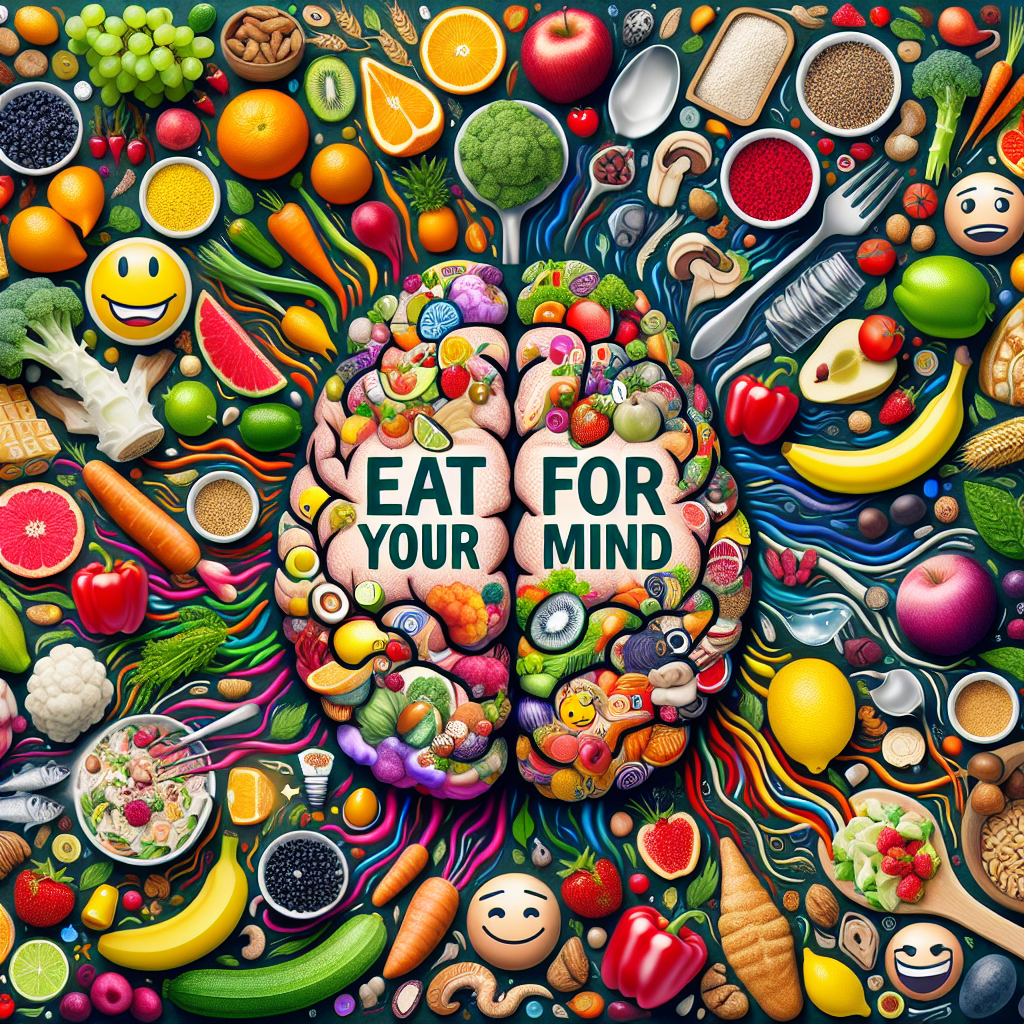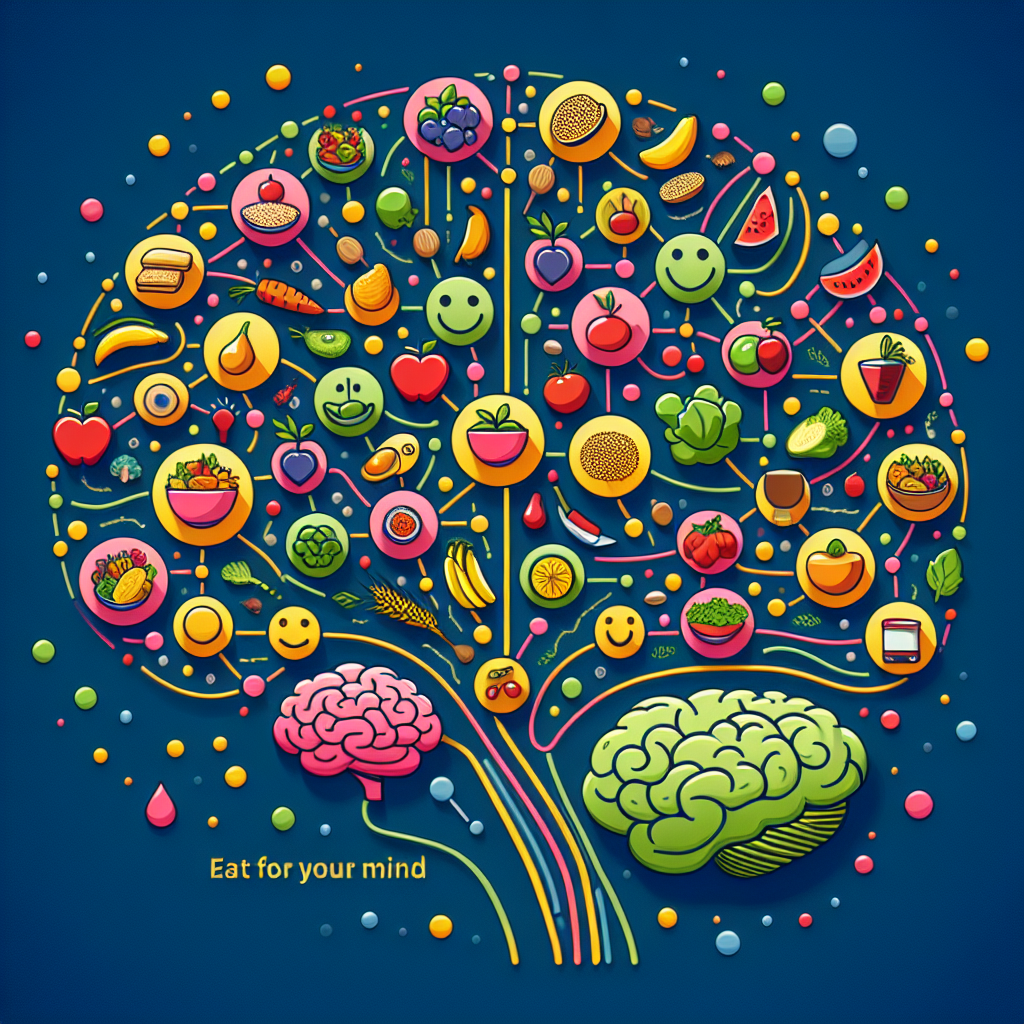Eat for Your Mind: The Food–Mood Connection

Discover the powerful connection between the food you eat and your mood. Learn how to eat for your mind and improve your mental health. Start your journey towards vibrant vitality today. Click here to learn more.
Exploring the Impact of Diet on Mental Health: The Food-Mood Connection
The connection between diet and physical health is well-established. However, the impact of diet on mental health is a burgeoning field of research that is beginning to reveal some fascinating insights. This article explores the food-mood connection, shedding light on how what we eat can influence our mental wellbeing.
The human brain is a complex organ that requires a variety of nutrients to function optimally. These nutrients, derived from the food we consume, play a crucial role in the production and function of neurotransmitters, the brain’s chemical messengers. Neurotransmitters such as serotonin, dopamine, and norepinephrine are instrumental in regulating mood, stress response, and cognitive function. Therefore, it stands to reason that a deficiency in these nutrients could potentially lead to mental health issues.
Research has shown that certain dietary patterns can be associated with a reduced risk of mental health disorders. For instance, the Mediterranean diet, rich in fruits, vegetables, whole grains, olive oil, and lean proteins, has been linked to a lower risk of depression. This diet is high in nutrients such as omega-3 fatty acids, fiber, and antioxidants, which are known to support brain health.
On the other hand, a diet high in processed foods, refined sugars, and unhealthy fats has been associated with an increased risk of depression and anxiety. These foods can cause inflammation in the body, including the brain, and can disrupt the balance of gut bacteria, which is increasingly being recognized for its role in mental health.
The gut-brain axis, a communication network between the gut and the brain, is a key player in the food-mood connection. The gut microbiome, the community of bacteria residing in our gut, can influence the production of neurotransmitters and inflammatory responses, both of which can impact mental health. A diet that supports a healthy gut microbiome, therefore, can potentially support mental wellbeing.
While the food-mood connection is compelling, it’s important to note that diet is just one piece of the mental health puzzle. Mental health is complex and multifaceted, influenced by a myriad of factors including genetics, environment, lifestyle, and personal experiences. Therefore, while a healthy diet can support mental wellbeing, it should not be viewed as a standalone treatment for mental health disorders.
Moreover, it’s crucial to approach the food-mood connection with a balanced perspective. While certain foods can support brain health, there is no ‘magic bullet’ food or diet that can guarantee mental wellbeing. It’s about overall dietary patterns, not individual foods. And it’s about balance, not perfection.
In conclusion, the food-mood connection offers a promising avenue for supporting mental health. By choosing a diet rich in brain-supporting nutrients and maintaining a balanced approach to eating, we can potentially influence our mental wellbeing in a positive way. However, it’s important to remember that diet is just one aspect of mental health, and professional help should be sought for mental health concerns. As research in this field continues to evolve, we can look forward to gaining a deeper understanding of the intricate ways in which food influences our mood and mental health.
Unlocking Brain Health: The Role of Nutrition in Enhancing Cognitive Function

The human brain, a complex organ with a myriad of functions, is the epicenter of our thoughts, emotions, and overall mental health. It is a powerhouse that requires a constant supply of fuel to function optimally. This fuel comes from the foods we consume, and what we eat can significantly influence our cognitive function and emotional well-being. This is the food-mood connection, a fascinating area of research that explores the relationship between diet and mental health.
The brain, like any other organ in the body, requires a variety of nutrients to function properly. These nutrients, derived from our diet, play a crucial role in the production of neurotransmitters, the brain chemicals that regulate our mood. For instance, serotonin, a neurotransmitter that contributes to feelings of happiness and well-being, is synthesized from the amino acid tryptophan, which we obtain from foods like turkey, eggs, and cheese.
Similarly, dopamine, another neurotransmitter associated with pleasure and reward, is produced from tyrosine, an amino acid found in foods such as fish, chicken, and almonds. Therefore, a diet deficient in these essential nutrients can lead to an imbalance in these neurotransmitters, potentially resulting in mood disorders such as depression and anxiety.
Moreover, our brain is a highly metabolic organ, consuming about 20% of the body’s total energy. This energy is primarily derived from glucose, which we obtain from carbohydrates in our diet. Complex carbohydrates, such as whole grains and legumes, provide a steady supply of glucose to the brain, supporting sustained mental energy and cognitive function. On the other hand, simple sugars, found in processed foods and sugary drinks, cause a rapid spike and subsequent crash in blood glucose levels, leading to fluctuations in energy and mood.
In addition to these macronutrients, several micronutrients also play a pivotal role in brain health. Omega-3 fatty acids, found in fatty fish, walnuts, and flaxseeds, are essential for brain cell structure and function. They also have anti-inflammatory properties, which may protect against neurodegenerative diseases like Alzheimer’s.
B-vitamins, particularly B6, B9, and B12, are involved in the production of brain chemicals and the maintenance of a healthy nervous system. Deficiencies in these vitamins have been linked to depression and cognitive decline. Antioxidants, such as vitamins C and E, protect brain cells from oxidative stress, a damaging process associated with aging and neurodegenerative diseases.
The gut-brain axis, a bidirectional communication system between the gut and the brain, further underscores the role of nutrition in mental health. The gut microbiota, the trillions of bacteria residing in our gut, can influence brain function and behavior through this axis. A diverse and balanced gut microbiota, fostered by a diet rich in fiber and fermented foods, has been associated with improved mood and cognitive function.
In conclusion, the food-mood connection is a testament to the adage, “you are what you eat.” A balanced diet, rich in essential nutrients, can support optimal brain function and enhance our mental well-being. While more research is needed to fully understand this complex relationship, it is clear that nutrition plays a significant role in mental health. Therefore, eating for your mind is not just about fueling your brain, but also about nourishing your emotions and mood.
The Science Behind Food and Mood: How Your Diet Influences Your Mental Well-being
The connection between food and mood is a fascinating area of study that has gained significant attention in recent years. It is now widely accepted that what we eat can significantly influence our mental well-being. This article will delve into the science behind the food-mood connection, shedding light on how our diet can impact our mental health.
The human brain is a complex organ that requires a variety of nutrients to function optimally. These nutrients are derived from the food we consume. Therefore, our diet plays a crucial role in maintaining our mental health. A balanced diet rich in essential nutrients can enhance brain function, improve mood, and even help prevent mental health disorders.
The brain is particularly fond of glucose, which it uses as its primary source of energy. Glucose is derived from carbohydrates found in foods such as fruits, vegetables, and grains. When we consume these foods, our body breaks them down into glucose, which is then transported to the brain. A steady supply of glucose helps maintain cognitive functions such as concentration and memory. However, it’s important to note that not all carbohydrates are created equal. Complex carbohydrates, found in whole grains and legumes, provide a slow and steady release of glucose, which is beneficial for maintaining stable mood and energy levels.
On the other hand, simple carbohydrates, found in sugary foods and drinks, cause a rapid spike in blood glucose levels followed by a sharp drop, leading to mood swings and energy crashes. Therefore, it’s advisable to limit the intake of simple carbohydrates and opt for complex ones instead.
Protein-rich foods are another important component of a mood-boosting diet. They contain amino acids, which are the building blocks of neurotransmitters – the brain’s chemical messengers. One such neurotransmitter, serotonin, plays a key role in regulating mood. Tryptophan, an essential amino acid found in foods like turkey, eggs, and cheese, is a precursor to serotonin. Consuming a diet rich in tryptophan can help increase serotonin levels in the brain, leading to improved mood and reduced anxiety.
Omega-3 fatty acids, found in fatty fish, walnuts, and flaxseeds, are also crucial for brain health. They help maintain the fluidity of brain cell membranes, allowing for optimal communication between brain cells. Research has shown that a diet rich in omega-3 fatty acids can help alleviate symptoms of depression and anxiety.
Lastly, let’s not forget about the gut-brain axis – the bidirectional communication between the gut and the brain. The gut microbiota, the community of microorganisms living in our intestines, can influence brain function and behavior. A diet rich in probiotics and prebiotics, which promote a healthy gut microbiota, can have positive effects on mental health.
In conclusion, the food we eat can significantly influence our mood and mental well-being. A balanced diet rich in complex carbohydrates, protein, omega-3 fatty acids, and probiotics can help maintain optimal brain function and promote mental health. However, it’s important to remember that diet is just one piece of the mental health puzzle. Regular exercise, adequate sleep, and stress management are also crucial for maintaining mental well-being.